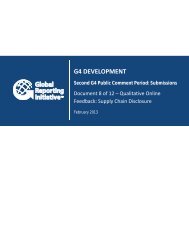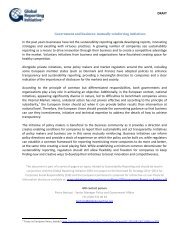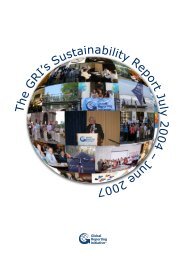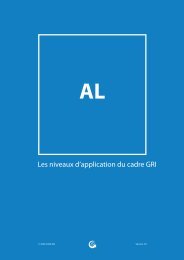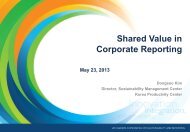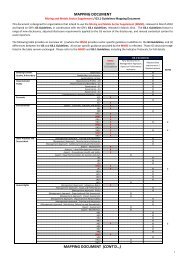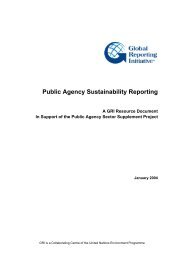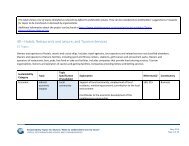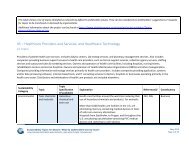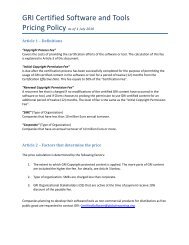CARROTS AND STICKS – PROMOTING ... - Global Reporting Initiative
CARROTS AND STICKS – PROMOTING ... - Global Reporting Initiative
CARROTS AND STICKS – PROMOTING ... - Global Reporting Initiative
You also want an ePaper? Increase the reach of your titles
YUMPU automatically turns print PDFs into web optimized ePapers that Google loves.
Core environmental issues today <strong>–</strong> climate, biodiversity and others <strong>–</strong> are clearly socioeconomic<br />
challenges as well. Looking at the stress we put on our natural resources as our<br />
economies expand and populations grow, it is abundantly clear that business as usual will<br />
not do. As managers in public and private organisations face changing market conditions,<br />
information overload and growing public demand for accountable resources use, they need<br />
new management tools and credible information to take action.<br />
This implies a new era for public reporting, both at national and organisational level. It<br />
implies that conventional models of running financial reporting and so-called non-financial<br />
reporting as two separate islands are no longer acceptable. It also implies that sustainability<br />
reporting can no longer remain the speciality of a top one hundred corporations, or an<br />
experimental area of expertise left to advanced communications agencies. It needs to<br />
be mainstreamed and scaled up on a grand scale. This cannot simply be the result of<br />
regulatory pressure, but different forms of regulation <strong>–</strong> including self-regulation <strong>–</strong> can play<br />
an important role in advancing the comparability, credibility and relevance of information<br />
disclosed.<br />
The <strong>Global</strong> <strong>Reporting</strong> <strong>Initiative</strong> remains the international reference for how to approach the<br />
reporting of holistic information on sustainability performance. Public regulators can build<br />
on this. They can help us to engage the accounting and investment community in defining<br />
integrated reporting and use of forward-looking indicators that reflect key resource use risks<br />
that organisations, markets and societies face today. UNEP looks forward to working with<br />
Governments, our project partners and others in this.<br />
The <strong>Global</strong> Financial Crisis has focused for many of us the need to rethink how we<br />
finance and to what end we use our human organisations <strong>–</strong> private, public and nonprofit.<br />
One can see a distinct change of mindset occurring where the previous notions<br />
of economic rationality, the paramountcy of quantification and the automatic balancing<br />
of free markets are beginning to have to take into account human irrationality,<br />
behavioural economics and emotional sensitivity, and more pragmatic approaches to<br />
the asymmetric nature of market intelligence.<br />
One sees this in the growing interest especially in the Corporate Governance world<br />
in two distinct ways. First, the developing differentiation between managing, and<br />
directing. Second, the growing public awareness of the connectedness of living<br />
systems. This both broadens and strengthens the definition of “stakeholders” of our<br />
organisations but leads to intellectual and operational discomfort amongst current<br />
directors and managers. <strong>Global</strong>ly, one can see the continuing historical move to create<br />
an annual reporting system for our organisations based on The Triple Bottom Line.<br />
This is easy to recommend but as we are only too aware it is easy for humans to<br />
agree the rhetoric and then argue “Lord, make me chaste, but not just yet”. The big<br />
issue is how does one get humans to willingly commit to the values and subsequent<br />
assessable behaviours that would allow a sustainable world to come into being? This<br />
report contains valuable insights into how to move forward and I commend it.<br />
Carrots and Sticks - Promoting Transparency and Sustainability<br />
Angela Cropper<br />
Deputy Executive Director, UNEP<br />
GRI Governmental Advisory Group<br />
Professor Bob Garratt<br />
Chairperson, Unit for Corporate<br />
Governance in Africa, University of<br />
Stellenbosch Business School<br />
3





